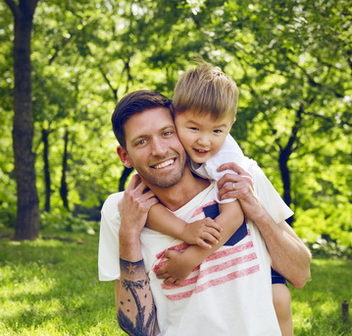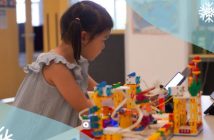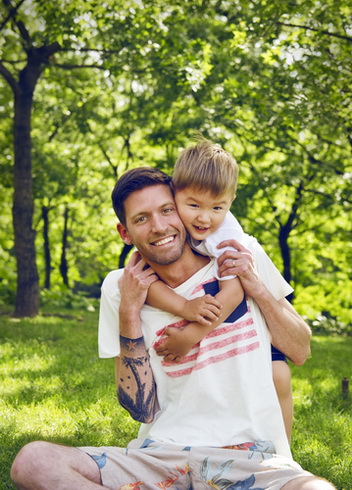
beijingkids dedicated the June issue to the dads for the Father’s Day issue. We spoke to four Beijing-based dads about their experiences of parenting. Part two features Richard Liu- Beijing expat for 25 years and father of two- and Michael Crain- founder of Chi Fan for Charity and father to twin girls. Two other days featured in part one can be found here.
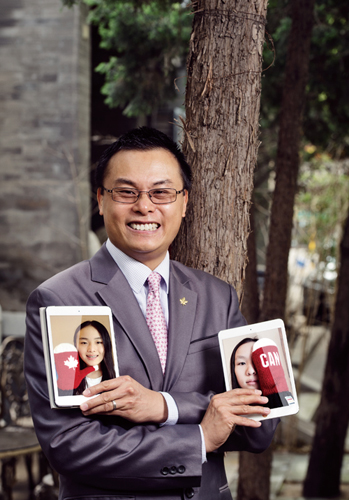
Richard Liu
Longtime expat Richard Liu is the founder of Canadian Alumni Network and Canadians in China. He is also the commissioner of the Beijing Softball League and the proud father of two girls: Elizabeth (age 14) and Paola (12), both students at the Western Academy of Beijing.
You’ve been in Beijing for 25 years, taking you from single guy to father of two. Tell us a about that experience.
Beijing has witnessed a lot of changes over the last 25 years. Residing in the capital as a young Canadian student presented many challenges at first. Since I traveled to China in the early 1980s with my parents and brother at least once a year, there wasn’t much of a culture shock when I arrived to begin my formal post-secondary education at Peking University in 1988.
Your wife isn’t Chinese but she isn’t from North America or Europe, either. How is it raising non-Chinese Asian children in Beijing?
My wife Elyse is from South Korea. Although she is fluent in Mandarin, she provides us with a third language and culture. Her immediate family and home country are only a short 1.5-hour plane ride away. [Having my parents in Beijing is also a rare treat. I feel blessed that my kids have both sets of their loving grandparents nearby to spend some quality time with and to spoil them from time to time.
What’s the best part of raising children in Beijing and what’s the worst?
Raising my children in Beijing over the past decade has been an ideal scenario, as it is safe and affordable [here]. Chinese people are very fond of children, which was evident with the loosening of the one-child policy recently. One early memory was the help my wife and I received while in a local restaurant trying unsuccessfully to have lunch while watching over our newborn. The waitress suddenly asked if she could hold Elizabeth. We didn’t have any problem with it and the other waitresses came over to coddle her and hold our baby; even the male cooks came out from the kitchen. I knew we’d be OK from then on.
What language(s) do you speak at home?
My girls were both born in Beijing, giving us an immediate connection to my Chinese roots. I was born and raised in Canada, exposed to Chinese culture and language only through my parents and the Chinese-Canadian community of Victoria and Vancouver. So it was exciting to watch my kids interact with both Chinese and expat children while speaking Mandarin like locals, going through a local schooling system in their early years, and adapting to local customs and knowledge.
You’re heading to Canada shortly. How do you feel about being a father somewhere other than Beijing?
The concept of moving for those who have deep roots in this bustling metropolis is a daunting thought, as you’re basically restarting your life, finding a new school, job, community, and making new connections. I’ve often thought about what it would be like to move and raise my kids in Canada; it’s not a bad option considering the various issues we are facing today, like the pollution.
What advice would you give to other fathers in Beijing?
My advice to fellow fathers is to watch the first five minutes of Robin Williams’ “RV” for a humorous take on how fast kids grow up. You can choose to stay or move, but watch your health and spend time with your kids, as in just a few short years it’s “adios” and they’re off to the races with “Where are the car keys?”
It’s also great to see that the online world has opened up in China. However, there is plenty of online material – from TV shows to movies and music – which does not have a ratings system, bringing to question if the entertainment industry in China needs to do something to ensure our children are not subjected to adult content. Guess that’s what happens when you open the windows of change – some flies always get in.
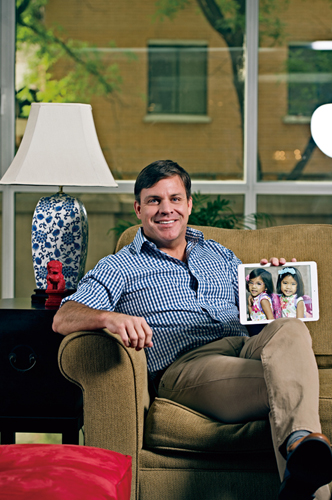
Michael Crain
American-born Michael Crain is the co-founder of Chi Fan for Charity, an annual dining event that works with restaurants and local personalities to raise money for worthy causes. He’s also a senior consultant and the director of administration at Bingham McCutchen, a global law firm. He has twin adopted daughters from Guangdong: Mackenzie and Mackaylee (age 5).
What’s it like being an adoptive parent in Beijing?
There is still a perception here that when everyone takes care of their own, everybody’s fine. But there is a disenfranchised population where people have decided to have children, but have also decided not to keep them for whatever reason. [With] our girls, I would presume the parents realized that they had not just one but two girls, and decided to give them up for adoption. We’re very fortunate that they were kept together.
In China, it’s hard to give children up for adoption so usually they are abandoned in a place where they can easily be found. As Caucasian parents of Chinese children – especially when we get outside of Beijing or Shanghai – people look at them, then at us. It takes a while to compute.
It’s taken a little bit of understanding from the girls, also. They would see a Chinese child with a Chinese woman and say “ayi.” We had to explain that maybe she’s an ayi or maybe she’s a mama. Not all mamas have blonde hair and blue eyes. It’s only now that they understand that they came from another woman’s belly, not [my wife]Joanna’s belly.
How do you have that conversation with the girls about being adopted?
In our case, we look different so they’re going to have questions. We were counseled to talk to them about being adopted from day one. Every year, I make a video of their year. The first video shows us getting them from the orphanage, so it opens the door for those questions to be asked.
Recently Mackenzie said something like “Let’s go to that place to buy babies,” because she wanted a little brother. Joanna said, “What do you mean?” and she said, “Let’s just go to the store and buy another baby.” So it was important for us to take them back to where we got them to see the orphanage, so that they know there are other children who are waiting to be adopted.
What about being the father of twins?
When we were told we were getting twins, people said, “Are you crazy?” We didn’t know what we were getting ourselves into. They were dropped in our lives at 18 months, already running around. We were at the Westin in Guangzhou, and all of a sudden one of them is eating the rind off an orange, the other is doing something else, and we thought, what did we just do? They just came in and took over, and it’s been that way ever since.
Even from the very beginning, they would switch personalities. One will be difficult, and the other will see that, and think “She’s being difficult and I have to hold back.” And they’ll do that for a while, and then they’ll switch back. We never had two crying babies at the same time. They’re each other’s best friends and worst enemies.
What’s it like going from not having children to being parents the next morning?
We had a very long waiting period; we had a nesting period rather than a pregnancy. Like natural parents, we visualized what our children would be like, but we also had photos of them.
Mackaylee came running out with arms open. Mackenzie needed a little more stroking; she immediately started crying, and didn’t let go for seven months. The first thing we did was take them back and scrub them down, and they started discovering water. I think it’s the same whirlwind that birth parents experience.
Many people in Beijing know you as the co-founder of Chi Fan for Charity. Was adoption part of a general spirit of charity that you and Joanna share?
We wanted to have a family and had talked about [adoption]. Now that I know how the system works and how many issues it has – it’s actually very difficult to put a child up for adoption here – why wouldn’t you want to give that child to someone who wants to raise a child? Part of the process is that they try to find the birth parents; if they’re found, the child or children are given back and the mother is punished.
What’s your advice for other fathers in Beijing?
You can do a lot more with children here that you [would]in other places. You also have help available that will make it saner to be a father. For fathers coming here, you can introduce your children to a completely different culture, so soak up the opportunity to put them in the language. Let them take martial arts, things they would not be able to do elsewhere. It gives them a chance to go back as a different child with a different perspective. Here, you have a relatively safe environment for kids; there’s not a lot of trouble they can get into, so they have the chance here to make discoveries.
This article originally appeared in the June 2014 issue of beijingkids. To find out where to get your free copy, email distribution@truerun.com or view it on Issuu.
Photos: PIXSTUDIO

